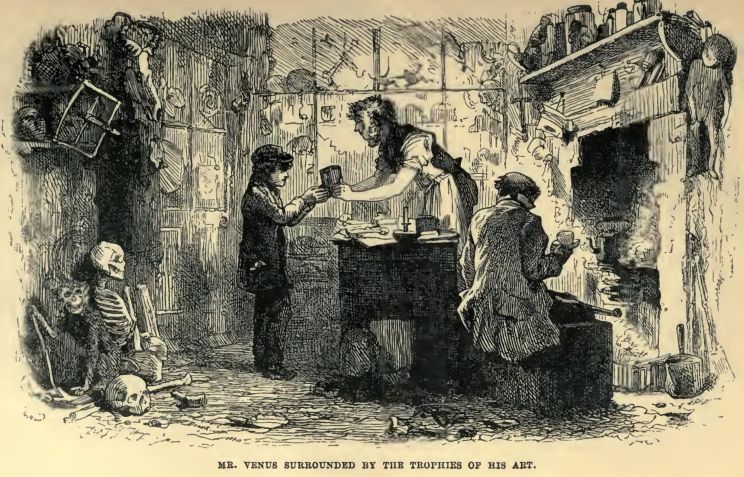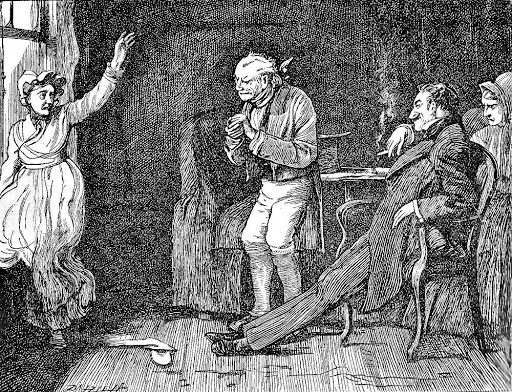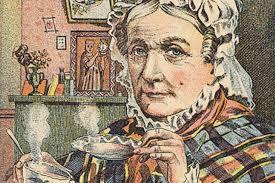Scenes of #tea drinking in Charles #Dickens's fiction often provide clues as to the moral integrity of characters.
In particular, how individuals use tea-time can be extremely revealing
In particular, how individuals use tea-time can be extremely revealing

Generally, in Dickens's fiction, tea-time is a chance for good characters to feed and solace others. Young John (above), Flora, and Herbert Pocket insist that depressed or stressed characters like Arthur Clennam, Little Dorrit, and Joe Gargery participate in the cheering ritual
However, tea-time can also provide a window of opportunity for bad characters to be stingy, greedy, or downright evil, their intentions masked by the communal activity of tea-drinking...
When Silas Wegg is asked by Mr Venus in "Our Mutual Friend" (1865), ‘My tea is drawing, and my muffin is on the hob, Mr Wegg; will you partake?’ Wegg agrees, "It being one of Mr Wegg’s guiding rules in life always to partake."
His appetite for selfish gain is evident!
His appetite for selfish gain is evident!
Besides enjoying Mr Venus's hospitality, Wegg uses the free tea for diabolical purposes: "Mr Wegg, as an artful man who is sure of his supper by-and-bye, presses muffin on his host to soothe him into a compliant state of mind, or, as one might say, to grease his works." 





Once Mr Venus has eaten several muffins with butter, he is "lubricated" enough to be receptive to Mr Wegg's desire to buy back his amputated leg 
Note that this is an Utterly Despicable use of Muffins for Chaotic Evil!

Note that this is an Utterly Despicable use of Muffins for Chaotic Evil!
Believe it or not, even worse abuses of tea-time can occur.
The French villain Monsieur Rigaud greedily devours breakfast, but when offered a sparse tea with Mrs Clennam in "Little Dorrit" (1857), M. Rigaud replies, "THANK YOU, NO TEA FOR ME."
(Capitals not in original)
The French villain Monsieur Rigaud greedily devours breakfast, but when offered a sparse tea with Mrs Clennam in "Little Dorrit" (1857), M. Rigaud replies, "THANK YOU, NO TEA FOR ME."
(Capitals not in original)
Not content with this, Rigaud spends tea-time gallantly ingratiating himself with Mrs Clennam and examining her watch, which contains the message "D.N.F.," meaning "DO NOT FORGET."
Of course, Rigaud aka Blandois aka Lagnier is up to no good...
Of course, Rigaud aka Blandois aka Lagnier is up to no good...
Wisely, Dickens advises us to distrust people who take tea with ulterior motives or "refuse to partake"






For an examination of the battle of good and evil as it plays out in tea vs. coffee choices in Dickens's fiction, see this article: https://www.npr.org/sections/thesalt/2018/02/07/584005673/coffee-or-tea-in-dickens-world-it-might-be-a-choice-between-good-and-evil
An overview of the history of afternoon tea: https://www.historic-uk.com/CultureUK/Afternoon-Tea/
And a discussion of tea temperatures and literature features a particularly evil Dickens character! https://www.wbur.org/npr/722875100/when-tea-reaches-its-boiling-point-in-fiction-so-too-may-the-story

 Read on Twitter
Read on Twitter













